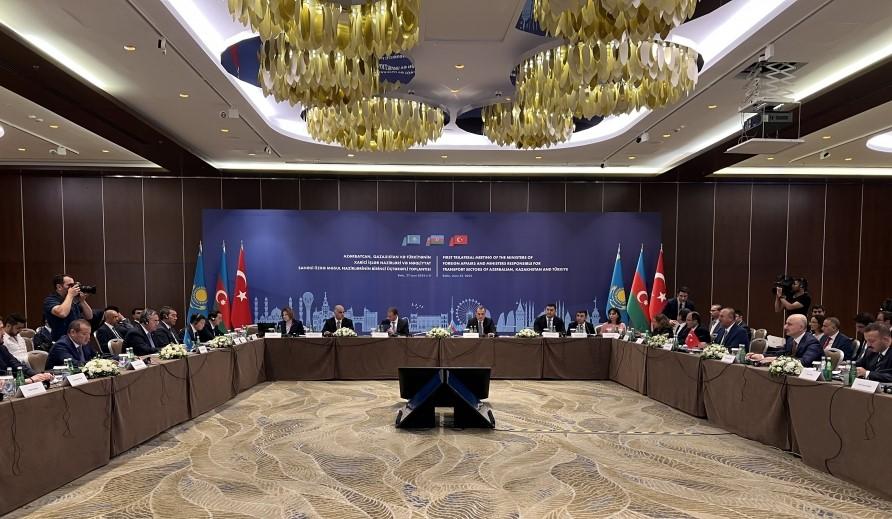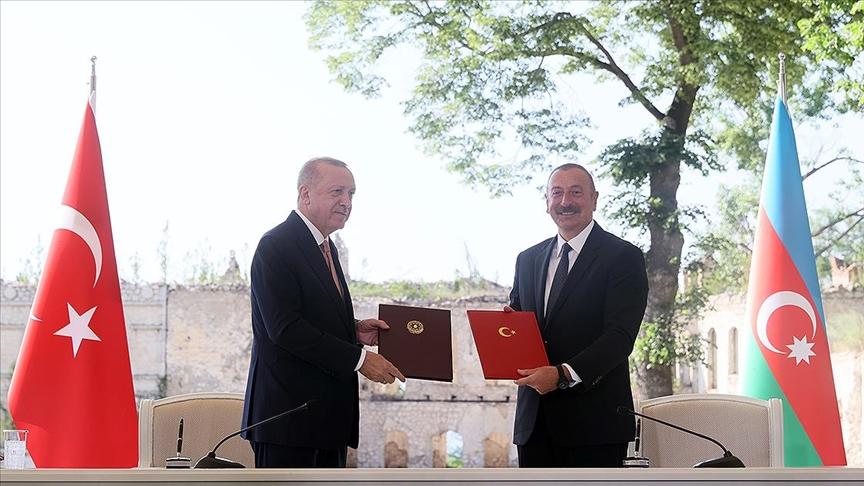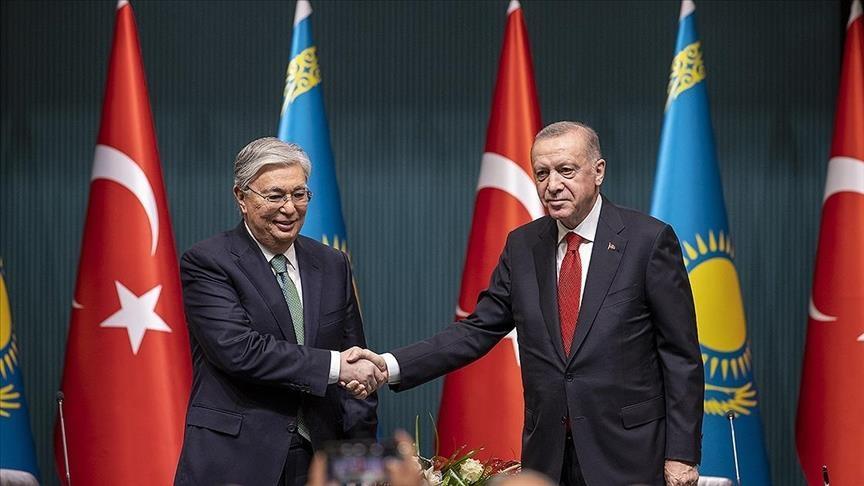Baku-Ankara-Nur-Sultan as agents of Turkic integration
Counterbalance to threats of global politics
ANALYTICS 29 June 2022 - 12:05
| Matanat Nasibova Caliber.Az |
The first trilateral meeting of the Azerbaijani, Kazakh and Turkish transport and foreign ministers took place in Baku the other day. The event is undoubtedly a landmark one since diverse options for joint activities were discussed during this meeting, and following its results, the parties signed the Baku Declaration providing for cooperation in the field of transport and communications.
In terms of economic feasibility, such an opportunity is significant because it opens up prospects for the implementation of large-scale projects of regional significance. That is, in the future, the conditions for expanding the transit potential of all three countries can be considered, which is very beneficial against the background of current threats to global security and economic development. From the point of view of economic feasibility, everything is going quite well: all three states are located at the intersection of the international East-West and North-South transport corridors, which allows them to play the function of transit countries connecting Europe and Asia.

In addition, Azerbaijan, Kazakhstan and Türkiye make a significant contribution to the development of Caspian-Black Sea cooperation by strengthening transport and communication links and expanding the trilateral trade potential. In fact, these are the main economic aspects of future trilateral cooperation, the strengthening of which is on the agenda of all three countries of the region. At the same time, the creation of a new economic union with the participation of these regional states is also aimed at strengthening the political dialogue between Azerbaijan, Kazakhstan and Türkiye. The fact that the three states cooperate closely in the Organisation of Turkic States (OTG), the Organisation for Economic Cooperation (ECO) and other regional organisations greatly contributes to the strengthening of the countries' interest in each other both in trade and economy and in regional politics, which is extremely important in the context of global political reformatting. Against the background of geo-economic and geopolitical processes taking place in the world, regional unions are becoming particularly important, and in this sense, the Kazakhstan-Azerbaijan-Türkiye trilateral political format can play a serious role.
Undoubtedly, the Turkic factor, based on a common religion, culture and political interests, sets a powerful tone for the rapprochement of the positions of Baku, Ankara and Nur-Sultan. And the fact that the foreign policy of all three states is aimed at strengthening Turkic unity is a fundamentally important point. If Azerbaijan and Kazakhstan received the status of regional states only three decades ago (after gaining independence as a result of the collapse of the USSR), then Türkiye, as a significant part of the greater Turkic world, has long established itself as a leading geopolitical player, with the interests of which such superpowers as the United States, Britain, Russia, as well as the countries of the NATO military bloc, in particular of which Ankara itself is a part. Without excessive pathos, it is worth admitting that it was Türkiye, thanks to a balanced and flexible foreign policy built up for many years, that raised the importance of the Turkic factor to a high level. And the political experience of Azerbaijan and Kazakhstan, which also fully support the idea of Turkic unity throughout the world, is of particular value on this path.
As for the specific trilateral format of cooperation, this was clearly accompanied primarily by fraternal relations between Türkiye and Azerbaijan, close relations with Kazakhstan, as well as bilateral ties between Azerbaijan and each of these countries. It is also important that the relations of all three countries are legally fixed by a military-political document.

As you know, in June 2021, Azerbaijan and Türkiye, having signed the Shusha Declaration, concluded a military alliance, demonstrating solidarity and mutual support on a number of issues of mutual interest. And this fact does not prevent Baku and Ankara from actively cooperating within the framework of international and regional organisations, including the UN, OSCE, Council of Europe, Council of Turkic Cooperation, and Organisation of Islamic Cooperation.
By signing the military alliance, Baku and Ankara have only once again confirmed their readiness for coordinated joint actions in the political and military spheres, in the field of security, based on common national interests. And here it is necessary to note another important aspect. The Shusha Declaration provides for the restructuring and modernisation of the Armed Forces, strengthening both countries' defence capability and military security. And this is an unambiguous request for unconditional military support of the parties in crisis situations.
At the same time, it is appropriate to recall that relatively recently, in this May, the Turkish and Kazakh leaders signed a joint statement on an expanded strategic partnership. On May 10, within the framework of the state visit of Kazakh President Kassym-Jomart Tokayev to Türkiye, Kakzkah Defence Minister Ruslan Zhaksylykov met his Turkish counterpart Hulusi Akar, during which a number of documents regulating bilateral military cooperation were signed. It is known that Türkiye highly appreciated the importance of expanding Turkish-Kazakh defence ties, including joint military exercises and the defence industry.
Interestingly, Tokayev's visit to Türkiye did not go unnoticed by foreign politicians and experts. Some of them were sceptical about the Kazakh president's trip, describing it as Türkiye's desire to strengthen ties with the Central Asian states that are still in Russia's influence zone. Meanwhile, the reality is changing. Expanding the agenda of cooperation with the countries of Central Asia, Türkiye does not set out to drive them into the orbit of its influence in order to create threats to the security of its regional allies, in particular Russia. Ankara consistently builds allied relations with Moscow based on pragmatism and mutually beneficial interest. Its foreign policy is aimed exclusively at preserving regional security and stability.

In this sense, the policy of Azerbaijan and Kazakhstan fully coincides with Türkiye's political aspirations. This, first of all. Secondly, it is appropriate to recall that it was Azerbaijan and Kazakhstan that offered Russia and Türkiye political mechanisms to overcome the crisis of 2015. President Ilham Aliyev then took a personal initiative to promote dialogue between Ankara and Moscow. Baku's friendly and wise gesture was rightfully appreciated in fraternal Türkiye. And this is just one of the few examples of how Azerbaijan and Kazakhstan show attention and support for the interests of Türkiye, including for the sake of maintaining regional stability and peace.
By the way, the unrealised idea of creating a military unit "Army of Turan", put forward at the time by ex-President Nursultan Nazarbayev, still looms as a threat to opponents of this idea. Relatively recently, this topic has regained a new political connotation after Turkish Defence Minister Hulusi Akar's visit to Kazakhstan in 2020. Then a number of foreign media outlets suggested that during the trip Akar plans to discuss the idea of a unified army of the Turkic countries with the country's leadership. Therefore, it is possible that in the foreseeable future this issue will again be discussed in the media, especially against the background of the current rapprochement of Kazakhstan, Türkiye and Azerbaijan.
Meanwhile, in the current geopolitical realities, the close cohesion of the three states of the Turkic world is a truly serious message for opponents of Turkic integration and at the same time a powerful message to all other Turkic–speaking states to unite their positions and raise the status of the Turkic world to a higher, more worthy level. In this sense, Baku, Ankara and Nur-Sultan, being the agents of Turkic integration, demonstrate a triple alliance in opposition to the threats of global politics.
Caliber.Az
|
1
|
Iran re-evaluating its ties with Azerbaijan, Armenia Baku - more important, honest partner than Yerevan
25 April 2024 - 12:00
|
|
2
|
Armenia returns four villages to Azerbaijan, paving the way for peace in the South Caucasus Landmark accord
23 April 2024 - 09:14
|
|
3
|
"Peoples of South Caucasus should resolve their differences independently" Foreign analysts on Caliber.Az
24 April 2024 - 17:40
|
|
4
|
Mark Rutte seeks Türkiye's backing for new job A new pair of hands
24 April 2024 - 16:55
|
|
5
|
Armenian PM's Moscow visit sparks speculation on bilateral relations Dilemma between East, West
23 April 2024 - 11:19
|
Azerbaijani, Kazakh military specialists convene for bilateral co-op discussions
26 April 2024 - 19:16
Armenia, Italy agree on military-technical cooperation
26 April 2024 - 19:11
Kazakhstan hosting meeting of defence ministers of SCO member states
26 April 2024 - 18:56
Azerbaijan, Armenia install 28 markers as border clarification works reach 35% completion
26 April 2024 - 18:50
UK’s ministry: Russian forces accelerating advance west of Ukraine’s Avdiivka
26 April 2024 - 18:41
Kazakh military delegation explores Azerbaijan's defense capabilities during visit
26 April 2024 - 18:35
France, Germany push on with 2040 joint tank project
26 April 2024 - 18:26
Political analyst: Demarcation of border with Azerbaijan meets Armenia’s vital interests
26 April 2024 - 18:11
Palestinian Resistance factions fighting against Israeli forces across besieged Gaza Strip
26 April 2024 - 17:56
US Central Command conducts humanitarian airdrops into Gaza
26 April 2024 - 17:41
Azerbaijan unveils programme of sixth World Forum on Intercultural Dialogue in Baku
26 April 2024 - 17:26
Azerbaijan's energy offer signals path to normalization with Armenia
Amid geopolitical shifts26 April 2024 - 17:24
Spain to send Patriot missiles to Ukraine
26 April 2024 - 17:11
Russia's oil revenues grow despite Western sanctions
Bill of the war26 April 2024 - 17:05
US, China spar over bilateral, global issues
26 April 2024 - 16:56
Kyrgyzstan's school-building gesture in Karabakh signals deeper ties with Azerbaijan
26 April 2024 - 16:41
Armenian PM vows to tackle existential challenges
We will address this issue26 April 2024 - 16:30
Azerbaijani police find explosive devices, ammunition in Khojavend
PHOTO26 April 2024 - 16:28
IAEA: Situation at Zaporizhzhia Nuclear Power Plant remains unpredictable
26 April 2024 - 16:13
US Mojave proves its unmatched versatility in unprecedented live-fire demo
26 April 2024 - 15:58
From energy cooperation to investment expansion
Baku, Budapest forge stronger business ties26 April 2024 - 15:45
Russian operation to seize Chasiv Yar offers most immediate prospects for significant advances
ISW analysts’ opinion26 April 2024 - 15:43
Turkish president to meet with US counterpart at White House in May
26 April 2024 - 15:28
Sweden to move ahead with sending troops to Latvia as part of NATO forces
26 April 2024 - 15:13
Armenian, Serbian FMs discuss regional issues
26 April 2024 - 14:58
COP29 leadership team, Spanish minister discuss Presidency’s Plan
26 April 2024 - 14:43
NATO Secretary General warns West against dependence on China
26 April 2024 - 14:28
Azerbaijani President attended High Level Segment of 15th Petersberg Climate Dialogue
VIDEO26 April 2024 - 14:19
Joint Turkish-Russian Monitoring Centre in Azerbaijan’s Aghdam ceases its activity
26 April 2024 - 14:13
All-Belarusian People's Assembly adopts new military doctrine, security concept
26 April 2024 - 13:58
President Aliyev highlights Azerbaijan's role in OPEC+ at Petersberg climate dialogue
26 April 2024 - 13:55
Royal Navy destroyer HMS Diamond shoots down missile fired by Houthis in Yemen
26 April 2024 - 13:43
Turkish-Russian center in Aghdam concludes with ceremony emphasizing peace efforts
26 April 2024 - 13:37
UN chief calls for swift deployment of security mission to Haiti
26 April 2024 - 13:28
Unraveling concerns of France, Greece in South Caucasus
A threat to stability in the region26 April 2024 - 13:17
US long-range missiles to Ukraine reignites German debate
26 April 2024 - 13:13
China hopes US Secretary of State's visit to boost dialogue
26 April 2024 - 12:58
Ukraine pulls US-provided Abrams tanks from front lines over Russian drone threats
26 April 2024 - 12:43
MFA: European Parliament’s resolution misrepresents human rights situation in Azerbaijan
26 April 2024 - 12:28
US to pull troops from Chad, Niger as African nations question its counterterrorism role
26 April 2024 - 12:13
